Steelcase
 | |
Formerly called | Metal Office Furniture Company |
|---|---|
| Public | |
| Traded as | NYSE: SCS |
| Industry | Furniture |
| Founded | March 16, 1912 in Grand Rapids, Michigan, United States |
| Founder | Peter M. Wege |
| Headquarters | Grand Rapids, Michigan, United States |
Number of locations | 80 (2014) |
Area served | Worldwide |
Key people | James Keane CEO |
| Products | Office furniture, architectural and technology for office environments and the education, health care and retail industries |
| Revenue | US$ 3.1 Billion (2015) |
Number of employees | 11,000 (2014) |
| Website | steelcase.com |
Steelcase is a United States-based furniture company founded in 1912 in Grand Rapids, Michigan. The company produces office furniture, architectural and technology products for office environments and the education, health care and retail industries. It is the largest office furniture manufacturer in the world.[1] It has facilities, offices, and factories in the Americas, Europe, Asia, the Middle East, Australia and Africa.
History
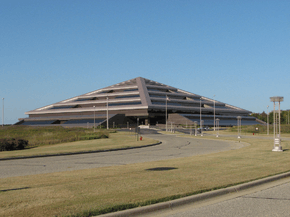
42°51′08″N 85°33′37″W / 42.8523°N 85.5603°W
Steelcase was founded as the Metal Office Furniture Company in 1912 by Peter M. Wege in Grand Rapids, Michigan. Wege was a veteran of the sheet metal and fireproofing industry and had filed approximately 25 patents prior to starting the company. The Metal Office Furniture Company's first products included fireproof metal safes and four-drawer filing cabinets, which Wege invented and manufactured for the Macey Company.[2]
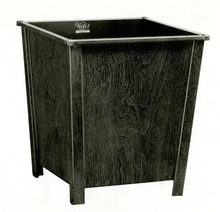
In 1914, the company received its first product patent for "The Victor," a fireproof steel wastebasket. The Victor gained popularity due to its light weight—achieved through a patented process of bending flat steel at right angles to create boxes—and its ability to prevent fires at a time when smoking was common indoors, particularly in the workplace.[3][4] In 1915, the company began manufacturing and distributing steel desks after designing and producing 200 for Boston's first skyscraper, the Custom House Tower.[3] In 1937, the company collaborated with Frank Lloyd Wright on office furniture for the Johnson Wax Headquarters. The partnership lasted two years and resulted in some of the first modern workstations.[3][5]
The name Steelcase was a result of an advertising campaign to promote metal office furniture over wood and was trademarked in 1921.[6] The company officially changed its name to Steelcase, Inc. in 1954.[4][5]
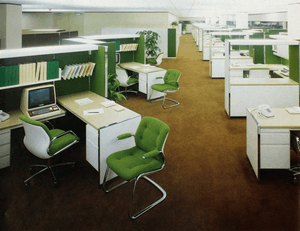
The company became known as the leader of the furniture industry in the late 1960s due to the volume of its sales.[4][7] Steelcase expanded into new markets during the 1970s, including Asia, Europe, and North Africa.[7] In 1973, the company debuted the Series 9000 furniture line, an office system that became a best seller and the company's flagship brand.[8][9] That same year, the company delivered the largest single furniture shipment to the then-new Sears Tower. The delivery included 43,565 pieces of furniture and furnished 44 floors.[5][7]
During the 1980s and 1990s, Steelcase shifted its approach to designing and creating products in response to changes in the workplace and economy. The company also focused on creativity and internal innovation by working closely with architects and interior designers to develop products as well the company's own workspace in Grand Rapids.[6][8] The company's current headquarters were built in 1983 on 901 44th St. SE in Grand Rapids, Michigan.[5] In 1989, Steelcase opened the pyramid-shaped Steelcase Inc. Corporate Development Center. The center contained ten research laboratories and workspaces meant to encourage interdisciplinary collaboration on product development.[6][8] Steelcase vacated the Pyramid in 2010, and as of 2015 is it still empty.[10] In 1996, Steelcase became the majority stakeholder in design firm IDEO and the firm's CEO, David M. Kelley, became Steelcase's vice president of technical discovery and innovation.[11][12] Steelcase sold its shares back to IDEO's managers starting in 2007.[13]
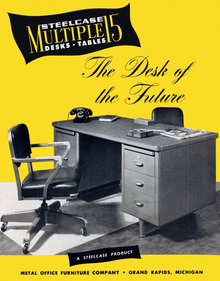
In 1996, Steelcase was found at fault in a patent infringement suit brought against them by Haworth, Inc., another furniture company. Steelcase was ordered to pay $211.5 million in damages and interest, thus ending a 17-year dispute with Haworth.[14]
Steelcase became a publicly traded company in 1998 under the symbol SCS.[6] During the 2000s, Steelcase reorganized its workforce and began integrating modern technologies in its products.[15] In 2000, the company opened Steelcase University, a center for ongoing employee development and learning.[16] Steelcase's wood furniture plant in Caledonia, MI earned LEED certification in 2001, becoming the first plant to receive the certification.[17] In 2002, Steelcase partnered with IBM to create BlueSpace, a "smart office" prototype designed using new office technologies.[18] In 2010, Steelcase and IDEO launched new models for higher education classrooms called LearnLabs.[19]
Company overview
Steelcase is a publicly traded furniture manufacturer headquartered in Grand Rapids, Michigan.[20] It is the largest office furniture manufacturer in the world.[1] The company has approximately 80 locations and 11,000 employees worldwide.[7][21] Its locations include Global Business Centers in Mexico, Malaysia, and Romania that provide support to local Steelcase dealerships and offices; showrooms called WorkLife Centers across the United States, Europe, and Asia, and in Toronto, Mexico City, Sydney, Melbourne, and Dubai; and manufacturing facilities in North America, Europe, the Middle East, and Asia.[7][22]
The company designs and produces furniture, furniture systems, architectural products, textiles, wall surfaces, and ergonomic and technology tools for workspaces, education, and health care.[20][23] Its products are sold online and through approximately 800 dealer locations.[24] The company also offers workplace consulting services.[25]
James Keane has served as CEO and president of the company since March 2014.[15] The company's revenue equaled US$3 billion in 2014, an increase from $2.9 billion in 2013.[21] Steelcase ranked 753 on the Fortune 1000 list in 2014.[20]
Brands
The three main brands of Steelcase Inc. are Steelcase, Coalesse, and turnstone. The company also has several other brands and subsidiaries, including Designtex, PolyVision, and Steelcase Health and Education.[4]
Steelcase acquired Designtex in 1988. Designtex offers interior textiles and upholstery.[26] The company established its office accessories brand, Details, in 1990.[27] In 1993, the company launched Turnstone, a line of furniture designed for small businesses and home offices.[15] PolyVision was acquired in 2001 and makes light-weight ceramic steel surfaces used for writing, projection, architecture, and interiors.[28] In 2006, Nurture was founded to create products for the health care industry, including furniture and interiors for waiting rooms, offices, and clinics.[29] The brand became Steelcase Health in 2014.[30] Steelcase merged three of its subsidiaries, Brayton International, Metro Furniture and Vecta to form Coalesse in 2008. Coalesse products are meant for what the company calls "live/work” spaces, a result of the frequent overlap of home and office in modern working habits.[31]
Company culture
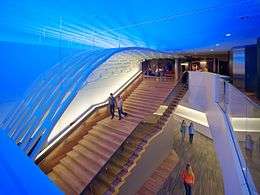
In 1985, Steelcase purchased the Meyer May House designed by Frank Lloyd Wright and restored it, opening it to the public in 1987.[32][7] A corporate art program has resulted in a collection including pieces by Pablo Picasso, Andy Warhol and Dale Chihuly.[33][34]
The company employs a research group called WorkSpace Futures to study workplace trends.[35] In 2010, Steelcase underwent a three-year project to update its Grand Rapids headquarters to promote employee productivity and employee well-being, including redesigning a cafeteria into an all-purpose work environment that provides food service and space for meetings, socializing, and independent work.[36][37]
Steelcase's sustainability efforts have included reducing packaging, using regional facilities to reduce shipping distance, cutting greenhouse gas emissions and water consumption, and a goal to reduce its environmental footprint by 25 percent by 2020.[34][38][39] As of 2012, Steelcase had reduced its waste by 80 percent, greenhouse gas emissions by 37 percent and water consumption by 54 percent since 2006.[39] According to the company's WorkFutures group, the company also analyzes its supply chain and materials chemistry to determine product sustainability. As of 2014, the company leads its industry in Cradle to Cradle-certified products.[34] In 2013, Steelcase employees volunteered 6,538 hours and the Steelcase Foundation donated US$5.4 million.[40]
Noteworthy products
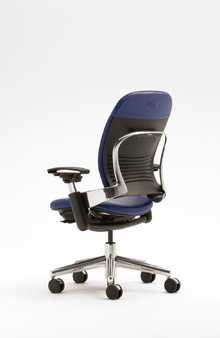
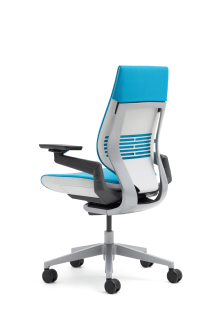
Steelcase's most noteworthy products include "The Victor" wastebasket, a patented steel fireproof container released in 1914. The Victor became a top seller for the recently founded company and was eventually expanded into a line of products.[4][6] The company released Multiple 15 desks in 1946, which introduced standardized desk sizing and became a universal industry standard.[3][6] Series 9000 was released in 1973 and became Steelcase's most popular line of office systems.[8][9] The Leap chair, introduced in 1999, sold 5,000 units a week during its first year and became the company's most popular release. The ergonomic office chair was designed with eight adjustable areas for users to control, including chair height, armrest positioning, lumbar support, seat depth, and back positioning. The chair was developed over four years, cost $35 million to design, and resulted in 11 academic studies and 23 patents.[41][42] The company released the Gesture chair in 2013, which is designed to support the way workers naturally sit.[42]
Awards
Steelcase was named among Fortune's most admired Home Equipment and Furnishings companies in 2011, 2012,[43] 2013,[44] and 2014.[45] The company won the Editors' Choice award at the 2014 NeoCon product competition for "Quiet Spaces," a series of workspaces designed for introverts and a collaboration with Susan Cain, author of Quiet: The Power of Introverts in a World That Can't Stop Talking. In addition, Steelcase's SOTO II Worktools won a Silver Award in the Office Accessories category.[24]
References
- 1 2 "World's largest office furniture supplier celebrates 100 years by reducing its energy consumption and carbon footprint". Control Engineering. February 14, 2013. Retrieved 5 December 2014.
- ↑ Susan Lovell (2003). Peter Martin Wege: A Biography. Pontiac, Michigan: Generations Publishing. pp. 21–29.
- 1 2 3 4 "Steelcase Turns 100". Architecture. March 29, 2012. Retrieved 11 October 2014.
- 1 2 3 4 5 Karen Dybis (August 2012). "100 Years & Building:Steelcase CEO Guides Vision for Future". Corp! Magazine. Retrieved 11 October 2014.
- 1 2 3 4 Jim Harger (March 13, 2012). "Unlikely early product among 10 notable moments in Steelcase history (Steelcase at 100)". MLive. Retrieved 11 October 2014.
- 1 2 3 4 5 6 "Steelcase, Inc. - Company Profile, Information, Business Description, History, Background Information on Steelcase, Inc.". referenceforbusiness.com. Reference for Business. 1998. Retrieved 11 October 2014.
- 1 2 3 4 5 6 "100 Years of Innovation Timeline" (PDF). Metropolis. April 2012. Retrieved 11 October 2014.
- 1 2 3 4 Margery B. Stein (April 1, 1990). "Teaching Steelcase to Dance". The New York Times. Retrieved 11 October 2014.
- 1 2 Andi Esposito (July 25, 1999). "Hudson firm taking bite out of competition". Worcester Telegram & Gazette.
- ↑ Blake, Neil. "Empty Steelcase pyramid's most recent tenants: A man and his dog". Michigan Live. mlive.com. Retrieved 10 August 2015.
- ↑ "Steelcase, IDEO Ally; Kelley Named Steelcase VP" (Press release). Steelcase. January 15, 1996. Retrieved 11 October 2014.
- ↑ Bruce Nussbaum (May 17, 2004). "The Power of Design". BusinessWeek. Retrieved 11 October 2014.
- ↑ Julia Bauer (September 20, 2007). "Steelcase's IDEO will be sold over next five years". Grand Rapids Press. Retrieved 8 January 2015.
- ↑ "$211.5 Million Award in Patent Lawsuit". The New York Times. December 31, 1996. Retrieved 11 October 2014.
- 1 2 3 Shandra Martinez (January 19, 2014). "Steelcase CEO Jim Hackett leaves 'remarkable' tenure at retirement". MLive. Retrieved 7 November 2014.
- ↑ Jennifer J. Salopek (October 2011). "Learning Has a Seat at the Table". T+D. Retrieved 11 October 2014.
- ↑ Jennifer Caterino (December 20, 2010). "Green Industrial". Architect. Retrieved 11 October 2014.
- ↑ Claudia H. Deutsch (January 14, 2002). "New Economy; I.B.M. and Steelcase lay out their vision of the office of the future.". The New York Times. Retrieved 7 November 2014.
- ↑ Kaomi Goetz (December 16, 2010). "How Steelcase Redesigned the 21st Century College Classroom". Fast Company. Retrieved 7 November 2014.
- 1 2 3 "Steelcase Inc. Company Information". hoovers.com. Hoover's. Retrieved 7 November 2014.
- 1 2 "Steelcase Inc-Cl A (SCS:New York)". bloomberg.com. Bloomberg Businessweek. November 7, 2014. Retrieved 7 November 2014.
- ↑ "Distributed But Not Distant: Bringing Remote Teammates to the Table". 360 Magazine. Retrieved 5 December 2014.
- ↑ "Steelcase Inc". bloomberg.com. Bloomberg Businessweek. Retrieved 7 November 2014.
- 1 2 Brianna Crandall (June 20, 2014). "NeoCon 2014: Steelcase wins Editors' Choice, Silver; work spaces unleash the power of introverts at work". FMLink. Retrieved 7 November 2014.
- ↑ "How Steelcase is Rethinking the Workplace". Steelcase 360. 2011. Retrieved 7 November 2014.
- ↑ Associated Press (August 7, 1988). "Steelcase Acquires N.Y. Fabric Firm". The Chicago Tribune.
- ↑ Sharon Stangenes (June 24, 1990). "The Human Touch: Manufacturers Discover That It Pays To Pay Attention To Workers Needs". The Chicago Tribune. Retrieved 7 November 2014.
- ↑ Associated Press (August 28, 2001). "Steelcase Says It Is Buying PolyVision". The Los Angeles Times. Retrieved 7 November 2014.
- ↑ Reena Jana (March 22, 2007). "Steelcase's Medical Breakthrough". Bloomberg Businessweek. Retrieved 7 November 2014.
- ↑ Karl D. Forth (July 7, 2014). "Healthcare continues to drive markets". CabinetMaker+FDM. Retrieved 7 November 2014.
- ↑ Jake Himmelspach (February 15, 2009). "Coalesse touts live and work environment". Grand Rapids Business Journal. Retrieved 7 November 2014.
- ↑ Jim Harger (March 16, 2012). "Why Steelcase has long link to legendary architect Frank Lloyd Wright (Steelcase at 100)". MLive. Retrieved 7 November 2014.
- ↑ Rhonda Brammer (April 5, 1999). "Steelcase: Designed For Durability". Barron's. Retrieved 7 November 2014.
- 1 2 3 Lindsey Howald Patton (May 2014). "Work How You Want". Green Building and Design Magazine. Retrieved 6 January 2015.
- ↑ Drake Baer (January 3, 2013). "Steelcase's Anthropologist on Remaking Offices to Create Happier Workers". Fast Company. Retrieved 7 November 2014.
- ↑ Adam Piore (March 2014). "Designing a Happier Workplace". Discover. Retrieved 7 November 2014.
- ↑ Fister Gale (May 30, 2013). "Some Companies Replace Cubicles With Flex Spaces". Workforce. Retrieved 7 November 2014.
- ↑ "Steelcase Reduces GHG Emissions 49% Since 2001". Environmental Leader. July 22, 2009. Retrieved 11 October 2014.
- 1 2 Mark Sanchez (April 28, 2013). "Steelcase details progress of sustainability efforts in new report". MiBiz. Retrieved 7 November 2014.
- ↑ Shandra Martinez (December 18, 2013). "Steelcase's secret to reducing its carbon footprint? Less travel, more video conferencing". MLive. Retrieved 7 November 2014.
- ↑ Bruce Sterling (August 7, 2000). "The Hot Seat". Wired. Retrieved 7 November 2014.
- 1 2 David Pogue (September 11, 2013). "Chair Pitched as Answer to New Ways We Sit on Job". The New York Times. Retrieved 7 November 2014.
- ↑ Shandra Martinez (March 21, 2012). "Why Grand Rapids companies Spartan Stores, Steelcase made Fortune's 2012 'Most Admired' list". MLive. Retrieved 7 November 2014.
- ↑ Charlsie Dewey (March 11, 2013). "Eight Michigan companies rank on Fortune's Most Admired list". Grand Rapids Business Journal. Retrieved 7 November 2014.
- ↑ Rachel Weick (March 5, 2014). "West Michigan companies rank among Fortune's 'Most Admired'". Grand Rapids Business Journal. Retrieved 7 November 2014.